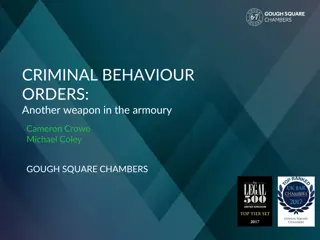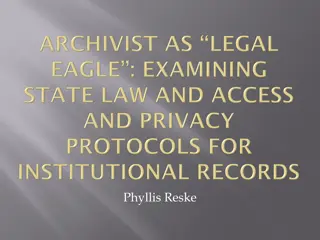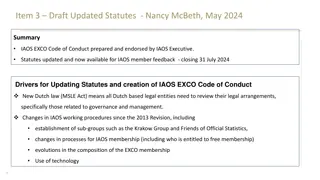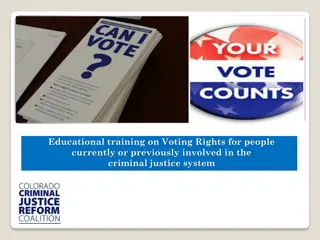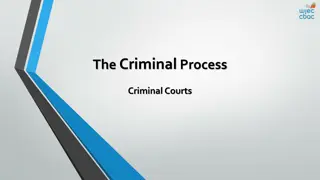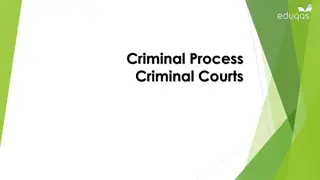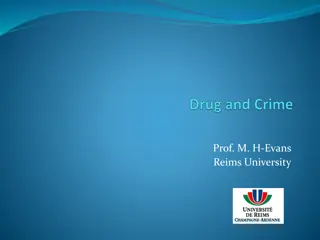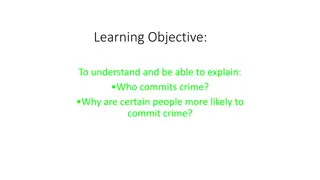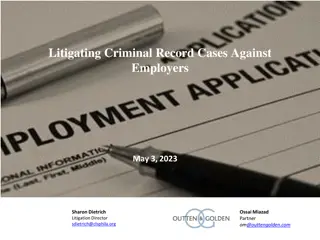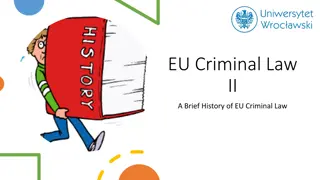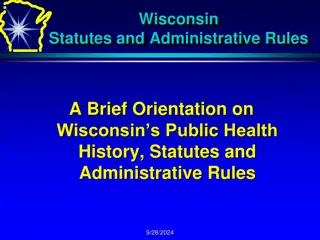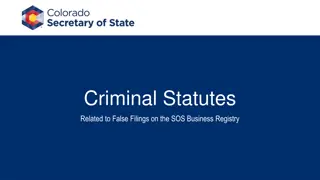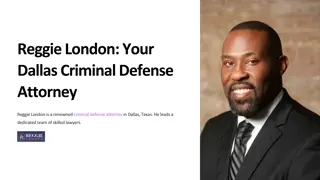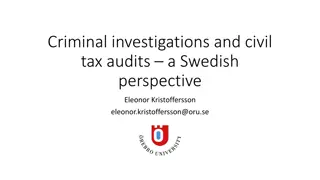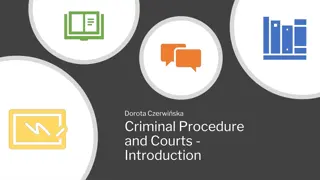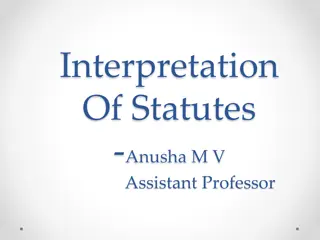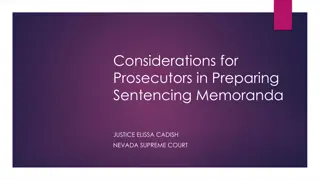United Nations Survey on Crime Trends and Operations of Criminal Justice Systems
The United Nations Survey on Crime Trends and Operations of Criminal Justice Systems (UN-CTS) focuses on harmonizing data collection, identifying crime patterns, improving monitoring of the criminal justice system, and enhancing international comparability of crime statistics. It was mandated by the
3 views • 18 slides
Harmonisation of Substantive Criminal Law in the EU
The Treaty of Lisbon serves as a legal foundation for the harmonisation of substantive criminal law within the European Union. It establishes the basis for judicial cooperation, mutual recognition of judgments, and approximation of laws across Member States. The treaty allows for the establishment o
2 views • 60 slides
Understanding Criminal Behavior from a Social Psychological Perspective
This unit delves into the application of social psychology in the legal system, exploring the nature of criminal behavior, responses to criminal acts, the criminal justice system, and rehabilitation. It examines the social ecological perspective of criminal acts and outlines key points related to th
0 views • 50 slides
Understanding Psychological Theories of Criminal Behavior
Psychologically-based criminologists attribute criminal behavior to individual factors such as negative early childhood experiences and inadequate socialization, leading to criminal thinking patterns and incomplete cognitive development. Probation and parole practices are influenced by rehabilitatio
0 views • 30 slides
Understanding Criminal Law and Procedure: Greenvisor's Case
A case study involving embezzlement by Joe Greenvisor, the chief accountant of Nobreath Corporation, sheds light on criminal acts, duties, intent, and societal perspectives on crime. Despite Greenvisor's charitable intentions, his actions constituted a crime under the law. The elements of criminal a
0 views • 47 slides
Understanding Mandatory and Directory Statutes: A Legal Overview
Mandatory statutes compel specific actions with no discretion allowed, making non-compliance potentially void. Directory statutes outline procedures without affecting substantial rights, with compliance regarded as a matter of convenience. The interpretation of these statutes rests on legislative in
1 views • 18 slides
Understanding Criminal Offences: A Comparative Analysis
Exploring the concept of criminal offences, this article delves into the definitions in common law and continental law systems. It discusses the structural elements, harmful nature, prohibition, punishment, and distinctive aspects of criminal acts. A comparison between common law and continental law
1 views • 33 slides
Interpreting Taxing Statutes: Key Principles and Indian Supreme Court Decisions
Understanding taxing statutes is crucial to comprehend the imposition of taxes. This overview delves into the definition of taxing statutes, the general rules of interpretation, strict constructions, and key principles. The discussion also touches upon significant decisions by the Indian Supreme Cou
2 views • 10 slides
Understanding the Process of Sealing Criminal Records
Having a criminal record sealed means making it inaccessible to the public while keeping it available to criminal justice agencies. Eligibility for sealing records requires taking action, and not everyone qualifies. This clinic provides guidance on the sealing process and the types of records that c
0 views • 36 slides
Aids to Interpretation: Understanding the Purpose and Types
Interpretation of statutes involves uncovering legislative intent. Internal aids (such as titles and preambles) and external aids help judges apply statutes accurately. Key factors include short and long titles, preamble statements, and substance over form. Case examples illustrate how titles can sh
0 views • 68 slides
Understanding the Roles in Criminal Justice System
The criminal justice system involves three branches of government, each with specific responsibilities, operating at federal, state, and local levels. Law enforcement is primarily a local government function, while legislatures determine criminal laws and punishments. Statutes organized into codes d
0 views • 35 slides
Understanding Substantive Criminal Law in the American Legal System
Substantive criminal law encompasses the definition of criminal acts and penalties, with a core principle being that there can be no crime without a corresponding law. The American legal system follows the Rule of Law, ensuring that all individuals are subject to legal governance. Constitutional lim
0 views • 22 slides
Confiscation in the Criminal Courts: A Guide to Proceeds of Crime Law
Confiscation in the criminal courts involves depriving defendants of benefits gained from criminal conduct within their means. The Proceeds of Crime Law in the Cayman Islands sets guidelines for these proceedings, emphasizing that confiscation is not a form of punishment but aims to recover obtained
3 views • 17 slides
Understanding the Process of Sealing Criminal Records
Sealing criminal records means restricting public access to the records, although they are not destroyed and remain accessible to certain entities. Eligibility requirements vary, and action must be taken to seal records. This presentation covers the process, eligibility criteria, and what to expect
1 views • 36 slides
Understanding Civil and Criminal Complaints in Legal Cases
Explore the distinctions between civil and criminal complaints in legal scenarios. Learn how a civil case seeks monetary damages while a criminal case pursues punishment for wrongful actions. Understand the roles of plaintiffs and prosecutors, burden of proof, and outcomes in both civil and criminal
0 views • 34 slides
Briefing on the Criminal Procedure Amendment Bill [B12-2021] to the Portfolio Committee on Justice and Correctional Services
The Criminal Procedure Amendment Bill aims to address the constitutional invalidity of section 154(3) of the Criminal Procedure Act by enhancing protection for child victims, accused, and witnesses in criminal proceedings. The Bill proposes prohibiting the publication of information revealing their
0 views • 12 slides
Understanding Criminal Behaviour Orders: An Overview and Legal Requirements
Criminal Behaviour Orders (CBOs) are issued following conviction for criminal offences to tackle serious and persistent anti-social behavior. This talk provides an overview of CBOs, legal requirements, when they are appropriate, and practical tips for implementation. The orders can prohibit or requi
0 views • 12 slides
Understanding the Power of Persuasion in Criminal Law
Explore the art of persuasion in criminal law, focusing on making effective arguments, analyzing murder statutes, and applying facts to crime elements. Discover how persuasion plays a vital role in convincing juries of guilt or innocence, and delve into the themes of prosecution versus defense.
0 views • 17 slides
Analysis of Wisconsin Statutes in Finding Aids for Institutional Records
In this analysis, various finding aids for institutional records in Wisconsin are examined, highlighting the use of state statutes as legal justifications for privacy and access restrictions. The study delves into the consequences and implications of citing irrelevant statutes and showcases the dist
0 views • 13 slides
Update on IAOS Statutes and EXCO Code of Conduct by Nancy McBeth, May 2024
In May 2024, Nancy McBeth updated the IAOS Statutes and endorsed the EXCO Code of Conduct, incorporating changes to align with Dutch law and IAOS procedures. The key updates include proposed major changes in statutes clarifying the relationship between ISI and IAOS, membership simplification, and EX
0 views • 5 slides
Asset Recovery Practices in England and Wales: Criminal vs. Civil Proceedings
Asset recovery in England and Wales involves a combination of criminal and civil proceedings to secure justice and return funds to victims of crime. The CPS's Proceeds of Crime Division plays a crucial role in obtaining Restraint Orders and Confiscation Orders. Civil recovery, focusing on illicit fi
0 views • 11 slides
Educational Training on Voting Rights for Individuals with Criminal Justice Backgrounds
This educational training focuses on voting rights for individuals currently or previously involved in the criminal justice system, specifically in Colorado. It covers the laws regarding voter eligibility for those with criminal records, the importance of understanding voting rights, and the consequ
0 views • 17 slides
Understanding the Criminal Justice System in Court Proceedings
This content explores various aspects of the criminal justice system, including the adversarial system, classification of offenses, criminal court systems, trial procedures, plea bargaining, and more. It covers models of criminal justice systems, classification of offenses, modes of trial, sending f
0 views • 15 slides
Overview of the Criminal Justice System
Exploring the complexities of the criminal justice system, this content delves into the adversarial system, classification of offenses, criminal court system, modes of trial, plea bargaining, trial procedures, and various criminal process models.
0 views • 15 slides
The Statistical Association Between Substance Misuse and Criminal Behavior
This brief synthesis discusses the statistical association between substance misuse (specifically drugs and alcohol) and criminal behavior. It draws upon meta-analyses investigating the links between drug use and crime, as well as alcohol consumption and violent behavior. Various theories are explor
0 views • 12 slides
Evolution of Criminal Law and Thought: From Pre-Classical Era to Enlightenment
Explore the progression of criminal law and thought from the Pre-Classical School of Thought to the Enlightenment era. Delve into concepts like folkways, mores, and the origins of criminal law, including examples such as societal norms, dress codes, and supernatural explanations for behaviors during
0 views • 23 slides
Exploring the Factors Behind Criminal Behavior
Understanding who commits crime and why certain individuals are more likely to engage in criminal activities involves exploring a range of social and biological factors. While biology suggests a genetic predisposition to criminal behavior, sociology emphasizes the influence of social factors like fa
0 views • 9 slides
Understanding Title VII and Criminal Records in Employment Discrimination Cases
This presentation delves into the intersection of Title VII and criminal records in employment discrimination cases. It covers the lack of specific protections for individuals with criminal records under Title VII, the implications of disparate impact cases, and the development of standards in the c
0 views • 15 slides
Asset Recovery: The Irish Approach towards Criminality
The paper discusses the emergence and structure of the Criminal Assets Bureau (CAB) in Ireland, highlighting the shift in approach towards dealing with criminal activities and the focus on targeting the proceeds of crime. It explores the operational positions and approaches adopted by CAB, emphasizi
0 views • 7 slides
Evolution of EU Criminal Law Through Cooperation and Commitment
The history of EU criminal law traces back to the Treaty of Rome in 1957 when the EU initially focused on economic matters. Over the years, with the judgment in the Stauder case in 1969 and the formation of the TREVI group in the 1970s, cooperation on security and combating terrorism laid the founda
0 views • 59 slides
Wisconsin Public Health Statutes Overview
Explore Wisconsin's public health history, statutes, and administrative rules, including the formation of the State Board of Health, consolidation of public health statutes in 1993, and the statutory duties of local boards of health. Learn about the chapters covering administration, communicable dis
0 views • 16 slides
Criminal Statutes Related to False Filings on the SOS Business Registry
A compilation of criminal statutes related to false filings on the Secretary of State (SOS) Business Registry, including acts such as causing false documents to be filed, perjury in the second degree, false swearing, abuse of public records, and offering false instruments for recording. These statut
0 views • 6 slides
Dallas Criminal Attorney | Frisco Criminal Attorney- Reggie London
Dallas Criminal Attorney: Dedicated Team of Criminal Defense Lawyers Led by Reggie London, Known for Unwavering Reliability and Steadfast Support. \/\/reggielondonlawyer.com\/
2 views • 7 slides
Exploring Criminal Law Basics
Delve into the fundamentals of criminal law through topics such as the definition of crime, the elements of a crime, why we have criminal law, and real-life scenarios to understand legal concepts. Discover the significance of criminal law in maintaining safety, encouraging good behavior, and promoti
0 views • 27 slides
Understanding the Interaction Between Criminal Investigations and Civil Tax Audits in Sweden
The relationship between criminal investigations and civil tax audits in Sweden is explored, highlighting how tax audits and criminal proceedings run concurrently. The mens rea requirement for criminal sanctions and tax surcharge, as well as the integration between criminal sanctions and tax surchar
0 views • 13 slides
Fundamentals of Criminal Law and Procedure
Explore the key aspects of criminal law and procedure, including definitions of crime, the role of criminal procedure, sources of law, phases of the criminal process, participants involved, and rules of evidence in legal proceedings. Gain insight into how criminal law is distinct from civil law and
0 views • 24 slides
Understanding Labor Standards Statutes on Federal Government Contracts
Explore the interaction of labor standards statutes like the SCA and DBA on federal government contracts. Learn about general principles, contracts requiring SCA or DBA, differences between SCA maintenance and DBA repair work, important considerations for DBA and SCA coverage, and specific guideline
0 views • 30 slides
Understanding Statutes: An Overview by Anusha M.V., Assistant Professor
This collection of images provides an insightful overview of statutes, covering their definition, creation process, commencement, operation, presumption against retrospective operation, repeal, and consequences of repeal. It explains the key aspects of statutes in a clear and concise manner.
0 views • 60 slides
Understanding Self-Defence in Criminal Law
Self-defence is a crucial aspect of criminal law, encompassing actions taken to defend oneself or others from harm. This defense allows the use of reasonable force in specific circumstances, both under common law and statutory provisions. The concept of self-defence is further clarified by relevant
0 views • 11 slides
Key Considerations for Prosecutors in Sentencing Procedures
Understanding sentencing memoranda, unique statutes, and the responsibilities related to mentally ill defendants, prosecutors must factor in crime details, criminal history, victim impact, mitigating factors, and additional penalties. The court's discretion in imposing deadly weapon enhancements and
0 views • 9 slides




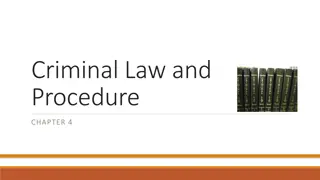
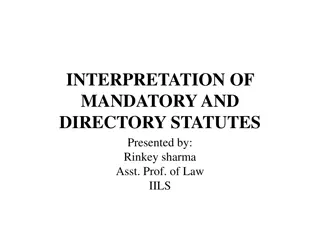
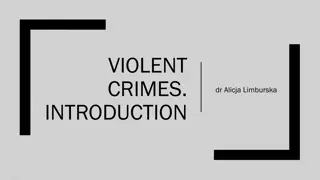
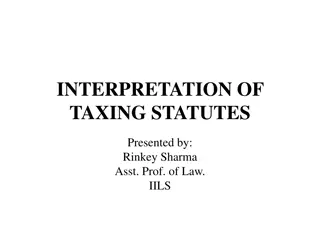

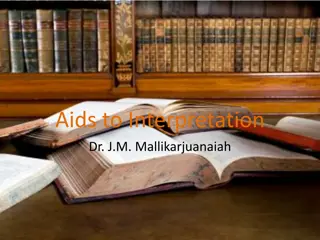
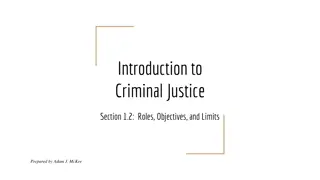
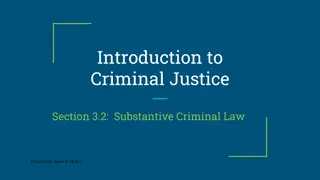
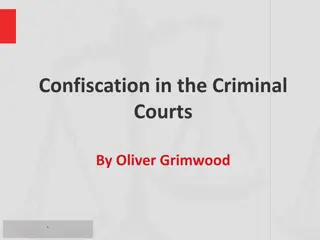

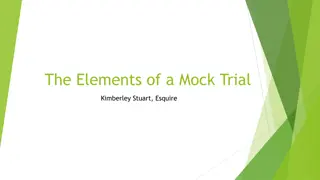
![Briefing on the Criminal Procedure Amendment Bill [B12-2021] to the Portfolio Committee on Justice and Correctional Services](/thumb/157093/briefing-on-the-criminal-procedure-amendment-bill-b12-2021-to-the-portfolio-committee-on-justice-and-correctional-services.jpg)
